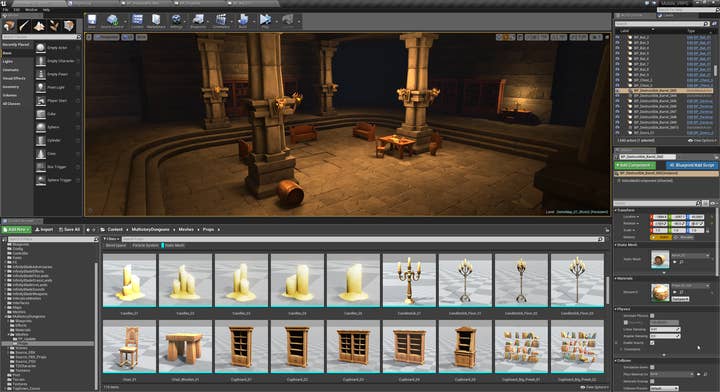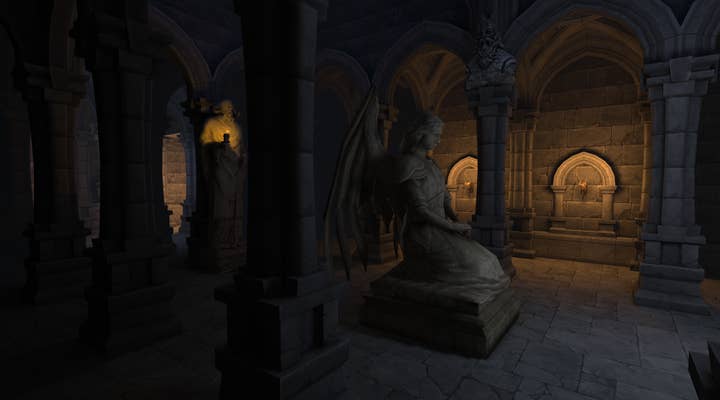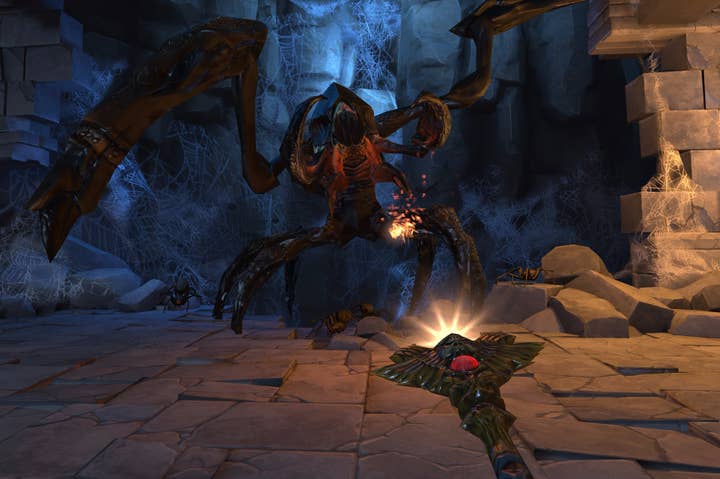Epic's mobile VR daydream
Technical director Nick Whiting talks Google's new Daydream platform
Today at Google's I/O keynote, Epic Games CTO Kim Libreri announced Unreal Engine 4 support for Google's Daydream mobile VR platform, as well as a new Dungeon game demo to show off its capabilities.
To mark the occasion we spoke to Epic Games technical director Nick Whiting about what the new platform means for developers and the future of VR.
I think it really broadens it up to the wider market. I was in my Uber the other day and the guy was asking me about what I did and he said: "oh yeah, I bought a Samsung phone so I can get the new GearVR." So it's much more democratized. Everyone has a phone in their pocket and with the Daydream spec in a year or two, it's going to be the level of phone most people already have in their pocket anyway so it makes it much more accessible and open up to a broader market than desktop apps. For desktop apps, you have to have a high-end PC or with PlayStation VR you have to have a PlayStation, and that's not necessarily the broad market because everybody has a phone in their pocket but not everybody has a super beefy PC at home.
"A lot of the game developers are gravitating towards the Oculus, Vive, and PlayStation calibre experiences because that's really their bread and butter market"
One of the cool things about it is that I think it opens up the market for a lot of different, interesting applications. Not just games necessarily but other markets and other verticals that will appeal to a broad consumer base. People doing serious applications, architectural visualization, car configurators, training in health and safety applications, stuff like that. It really democratizes it in a big way because it opens up the consumer base.
It's kind of different strokes for different folks. A lot of the game developers are gravitating towards the Oculus, Vive, and PlayStation calibre experiences because that's really their bread and butter market and they're really good as gaming platforms, but we also find that a lot of people that are just trying to get their applications out there so entertainment companies, film companies, there's a lot of interest. Especially high-end architectural visualizations and manufacturing are much more interested in the mobile platform because it's something that they can take with them and is much more accessible. You can deploy a Daydream to a field office but you can necessarily haul a high-end PC out there, so really that opens the door to a lot of people to get interested in making something VR at all.

I think it's just because everyone is really excited about a brand new medium. There's something magical about sticking a VR headset on your face, you immediately get immersed in the world and this magical experience that really hasn't been possible with TV and traditional media. I think people are saying "hey, I want to explore this" and getting into it. Especially from the film industry. They're always looking at ways to reuse the assets that they've already created for film pre-visualisation or expand their market and their reach into other applications that get people more excited about their core business and I think VR is a really good way to do that. They've already been making 3D environments for a while, so it's a natural fit for them to move over.
On the other side, on the more serious applications, when you talk to architects or even construction managers one of the things that are the biggest cost sink in their business is that it costs a lot to put up a building and then have someone tell you they don't like the look of it. Anything that they can do to prevent that from happening saves them millions and millions of dollars. If an architect can show a client a real-time rendering that feels like you're actually wandering around the space and they can point out stuff they don't like that saves them a lot of money. So it's a way to make things a lot more accessible in other markets so it's an economic incentive for those people.
"A lot of people have Google Cardboard as their first contact with VR and there's really no certification process for it"
I think that's exactly what stuff like Daydream does, a lot of people have Google Cardboard as their first contact with VR and there's really no certification process for it. Google is very cognisant of that, that's why none of the Cardboard headsets have straps on them, they're not meant for long term use because there's no established minimum spec and you can't be sure that people are going to have the technical performance to make it a good thing to stay in for a long period of time.
I think Daydream, by adding the certification for the hardware, really helps them establish a minimum bar for a consistent quality experience that won't turn people off to VR and will instead turn people onto to VR. The addition of the motion controller to it adds the interactivity which I think is important in keeping the VR magic. Once people put on a VR headset and look around the first time it's cool for 30-45 seconds just by virtue of being VR but then people look down and say "hey where's my hands" and that really breaks the magic bubble a little bit, for lack of a better term.

So the fact that they're making the motion controller an integral part of the Daydream platform I think goes a long way to making a VR experience that someone will want to try to repeat again and will be a cool experience that people will actively seek out, which will aid adoption.
I wish I was a prophet and I could tell you because there're many variables in it that it's really hard to pin down, but I think things like Daydream especially accelerate it because the more good quality VR stuff that you can get in front of people the faster it's going to be to adopt because as soon as people try a good VR experience as opposed to just a "meh" VR experience you have a very high percentage of converts to VR. People that are going to go and actively seek that out. The quicker we can get that broader adoption the quicker it's going to be mass adopted.










